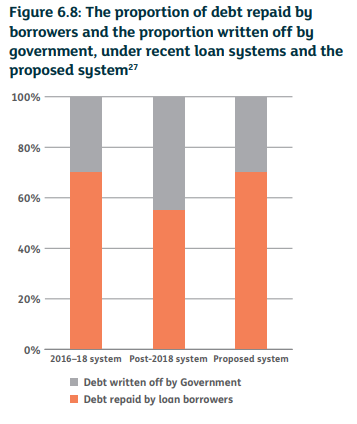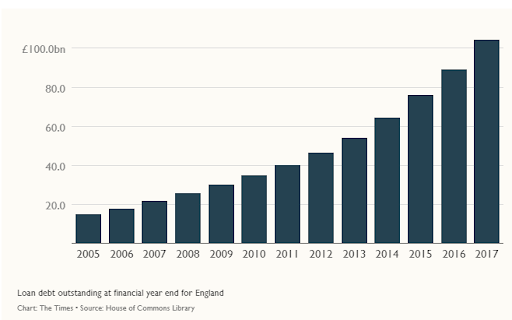Tuition cuts a “shallow gesture” claims Labour minister
A recent report recommends cutting tuition fees but a shadow education minister says this will not resolve problems within higher education.

Tuition fees should be slashed and repaid with less interest over a longer period of time before being written off, according to an independent report published last week. The report also recommends the reintroduction of maintenance grants.
The Augar report, commissioned in February 2018 as part of a wide-ranging review of higher education, recommended tuitions fees for domestic students should be capped at £7,500. Universities can currently charge up to £9,250 per year. In addition to this, the independent panel led by Philip Augar advised graduates should repay student loans over 40 years and be charged less interest. At present, student debts accrue interest of up to 6.3% and are written off after 30 years.
The government should also reintroduce means-tested maintenance grants of at least £3,000 per year – a proposal that has been championed by outgoing Prime Minister, Theresa May. The Treasury has warned that this could cost £6 billion per year. The national budget may also be hit by the report’s recommendation that the government should increase its financial contributions to make up for the loss of universities’ incomes as a result of lower tuition fees. These increased contributions should, according to the report, be focused on the courses which are most expensive to provide – such as STEM subjects – and those that offer “better value”.
However, former Universities Minister, Jo Johnson, has expressed doubts over the Treasury’s willingness to increase higher education funding, saying the Augar report’s recommendations will “destabilise university finances, imperil many courses and reverse progress in widening access”. Education Secretary, Damian Hinds, has dismissed claims that the Augar report’s recommendations will put universities into financial hardship as “scaremongering”.
Shadow Education Minister, Gordon Marsden, has described the proposed cut to tuition fees as “a shallow gesture” that “will not resolve the issues that affect prospective students or our institutions”.
Addressing the House of Commons earlier this week, Hinds said: “Whatever decisions we make about how best to take forward recommendations in this report, it's vital that we support these institutions to continue to offer world-leading higher education to students in future.”

Analysis
Last year, Imperial College submitted three priorities to the Augar report’s review panel. The College said any changes to financing must be sustainable and bridge the gap [estimated at £90 million for Russell Group universities alone] between existing funding for and the actual cost of providing “a world-leading STEM education”, and should ensure higher education is accessible regardless of a student’s financial circumstances. How far do the Augar report’s recommendations meet these priorities?
Analysis by auditing firm KPMG revealed that UK universities spend 42% of their income on teaching – considerably less than higher education institutes in other countries. Managing estates, student services, and corporate and administrative costs account for 47%. The remaining 10% is used as a “margin for sustainability and investment” (i.e. money used to protect against future risk and to ensure services and standards can be maintained or improved). This MSI equates to an average of £1,000 per student – a figure the Augar report describes as “substantial”. The report also notes that the higher education sector is “in a reasonably solid financial position”.
The specialised equipment required for many STEM subjects means these courses are more costly to provide than many arts- or humanities-based degrees. As a STEM-focused university, Imperial has less opportunity to subsidise more expensive courses with surplus from courses that cost less than £9,250 per student per year, as many other universities do. However, Imperial may be able to benefit disproportionately if the government decides to implement the recommendation that funding should be focused on “high-cost and high-value subjects” as part of the government’s Industrial Strategy, which includes a pledge to increase spending on research and development from 1.7% to 2.4%. The Augar report states: “Our proposals … are intended to encourage [STEM education] and are likely to result in more funding going to institutions with a strong research base.”
The reintroduction of maintenance grants, which do not have to be paid back, will help those less able to cover their living costs but the benefits of the report’s other suggestions – cutting tuition fees and interest rates while spreading repayments over a longer period – are less certain.
As Felix has previously reported, cutting tuition fees primarily benefits the highest-earning graduates. Two in five graduates earn less than £25,000 five years after graduating, meaning they fall below the threshold at which they have to start repaying their student debts, which, on average, amount to over £50,000. Even factoring in the additional ten years before the debts are written off, low-earning graduates are unlikely to see any significant change in the amount they pay back. Higher earners, who are already more likely to be able to pay off their debts in full, will pay back a lower total amount. An analysis by The Times estimates that the top 5% of earners would pay back £37,323 under the Augar report’s recommendations, compared to £55,452 under the current system. Meanwhile, middle-earners on salaries of £30,000-£40,000 – who currently repay an average of £14,844 – would end up repaying £26,667.










